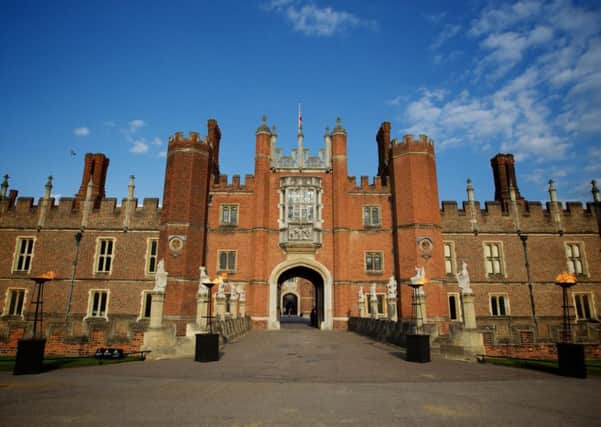Nostalgia: Royal consent for new Bible


Several English versions of the Bible had been printed before 1611. William Tyndale (1494-1536), a brilliant young Oxford scholar with extraordinary skill in Greek and Hebrew as well as Latin, had been forced to flee to the continent to escape Henry VIII’s persecution of Protestants. Eventually, Henry’s agents kidnapped him and he was strangled then burned as a heretic, but not before his translation of the New Testament had been printed in Germany and spread to England along with his unpublished work from the Hebrew Old Testament. It is one of the many tragic ironies in history that Tyndale’s banned book came to be authorised by the king who had ordered his death and would later become 90 per cent of the 1611 edition of the New Testament.
Two more English translations were printed in 1535 and 1537, but then came Henry’s Great Bible of 1539, so big and cumbersome that it could be read only from a lectern. It was ordered to be set up in every church in the land where 90 per cent of the people were illiterate. However, unlike Tyndale, none of his successors knew Hebrew and Greek as well as he did and so they translated the Old and New Testaments, not from their original form, but from the Vulgate or Latin versions. During the reign of Queen Elizabeth, another English Protestant Bible, the so-called Geneva or “Breeches” Bible (realising they were naked, Adam and Eve had made themselves “breeches”) was printed and used extensively in parish churches. At the same time, English Catholics preferred their own editions of both Testaments, which came to be called the “Douai” version.
Advertisement
Hide AdAdvertisement
Hide AdIt was this proliferation of English Bibles that prompted Puritans to ask King James I for a definitive translation. James readily agreed on condition that it should become the only authorised Bible and that it must be printed on his authority alone, omitting pejorative references to royal tyrants and supporting the divine right of monarchs! Accordingly, in January 1604, only a few months after his coronation, the king opened a conference at Hampton Court. To his credit, he steered a middle Protestant course between the “Anglo-Catholics”, who wanted the church in England to retain more Catholic practices, and the Puritans, who detested all of them.
James himself was a Biblical scholar and he was determined that the new Bible should be his, a royal Bible, endorsing his divine authority to rule. (Another irony is that those American republican leaders, such as George Washington, who rebelled against George III, did so as implicit believers in the King James Bible as the word of God.)
About 50 unpaid scholars, most of them from Oxford and Cambridge, but all accomplished linguists and theologians, took four years to reach a conclusion, before it was passed to the archbishop of Canterbury and finally to King James. It was to be read out in all churches, cost 12 shillings in “hardback” and 10 in loose leaves. There were no illustrations, but many misprints: “Thou shalt [not] commit adultery”; “let the children first to be killed [filled]”; hating “life” became hating “wife”. Anglo-Saxon vocabulary predominated, not words derived from Latin.
It took some time before the Authorised Version supplanted all other Protestant Bibles. The Pilgrim Fathers, who crossed the Atlantic to settle in the New World in 1620, took the Geneva Bible with them: after all, they were Calvinists, not Anglicans. However, these Puritan pioneers were soon followed by many other religious dissidents who believed that God had abandoned England and that America was the land promised by God to the Israelites. For them, the King James Bible was God’s word.
Advertisement
Hide AdAdvertisement
Hide AdThe new Americans never considered adopting the languages of the old Americans: theirs was English alone, the tongue of God’s holy book. All wisdom, justice and holiness were to be found only in the Bible: it was their creed, it gave them laws, it guided their lives and determined their morals. Most of them never read or recited any other book. A few Indian words, such as “squaw”, “wigwam”, “totem”, “tomahawk” and “moccasin”, were accepted, but others that were foreign to them, such as “raccoon”, or “skunk”, they Anglicised. Essentially, they continued to use the antiquated lexicon of the 1611 Bible.
As the British empire spread out across the planet, English took the place of French, as French had succeeded Latin, so that the Authorised Version was the one book that connected all the world’s English speakers.
Unfortunately, this Bible was the source of a multitude of contradictions. Almost any argument or cause can find validation in the Old Testament, including slavery, capital punishment and genocide. As Henry VIII discovered, Leviticus declared it was “unclean” for a man to take his brother’s widow and they would be childless, whereas Deuteronomy applauded a man who took his brother’s widow as his wife. Similarly, monarchists who believed that their king was divinely chosen and appointed were contradicted by republicans who thought that bad kings should not be obeyed or even killed. Both quoted the Old Testament as their authority. As Jesus had said, “He that is not with me is against me.” There was no room for compromise between Roundheads and Cavaliers. In the Old Testament there is much “smiting”, slaying and slaughtering.
More than 90 per cent of the words used in the King James Bible are of English origin. Along with Shakespeare’s works, it has ensured that the language of the Anglo-Saxons has become world-wide. Today, though mainly godless and secularised, we still use hundreds of phrases, unmindful that they are of Biblical derivation. And some of the greatest and best known speeches, from Hamlet and the Gettysburg address to Martin Luther King, have been delivered in the language and syntax of the King James Bible.
(to be continued)